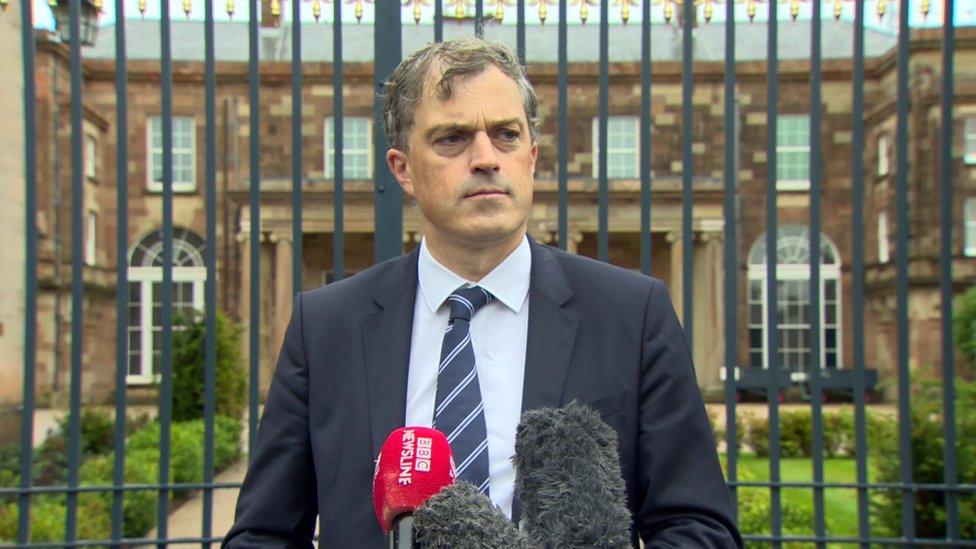Brexit making Stormont talks 'extremely difficult', says peer
- Published
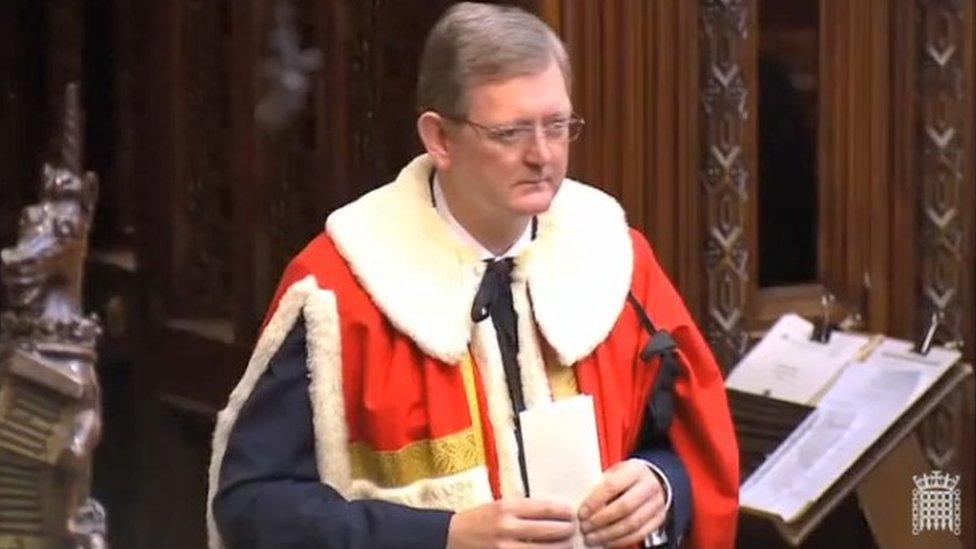
Lord Caine, who is from Leeds, started working for the Northern Ireland Office in the 1990s
The longest serving Conservative adviser on Northern Ireland has said Brexit is making the task of reviving the Stormont power-sharing government extremely difficult.
Jonathan Caine said the issue has "loomed over" the talks aimed at restoring devolution.
The Northern Ireland Assembly collapsed in January 2017 after a scandal over a renewable heating scheme.
Efforts to restore the institutions have so far proved fruitless.
Lord Caine also told BBC Radio Ulster's Inside Politics programme that if the UK leaves the EU without a deal, the government will need to appoint ministers to direct the response by the Northern Ireland Civil Service.
He acknowledged such a move would provoke criticism from the Irish government and nationalist politicians.
'Sigh of relief'
Whilst he acknowledged this would be regrettable, the Conservative peer thought it might be necessary in order to oversee policies such as major financial intervention to support Northern Ireland's agri-food sector.
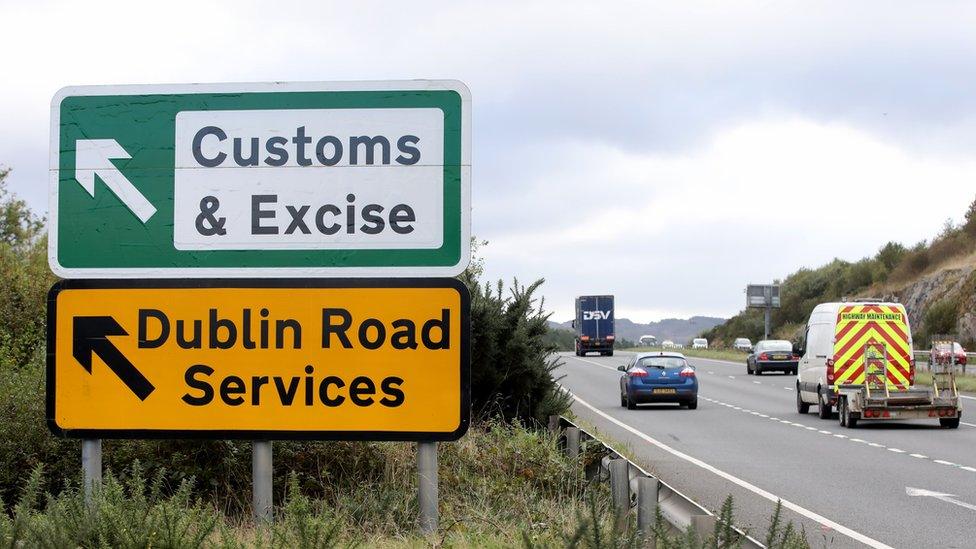
Lord Caine believes direct rule ministers would help to oversee major policies in the event of a no-deal Brexit
He also thinks many members of the public would "breathe a sigh of relief" once they start to see important decisions being taken.
Lord Caine is not a familiar face to the Northern Ireland public, but he was a near constant presence behind the scenes during much of the peace process.
He worked with a string of Conservative NI secretaries, from Tom King, Peter Brooke and Patrick Mayhew in the 1980s and 90s through to the more recent office holders - Owen Paterson, Theresa Villiers, James Brokenshire and Karen Bradley.
Jonathan Caine helped draft David Cameron's speech accepting the verdict of the Bloody Sunday Inquiry and had a role in brokering the Stormont House Agreement on dealing with the legacy of the Troubles.
Mr Cameron made him a Conservative peer when he resigned as prime minister in 2016.
Lord Caine left the government as a special adviser after Boris Johnson appointed Julian Smith as secretary of state.
'Four-yearly border poll'
The Conservative peer said he wishes Boris Johnson well, but fears some elements of the prime minister's latest Brexit plan could prove destabilising.
"I am concerned about this idea that we will have a four-year vote on regulatory alignment, whether its with the EU or Great Britain," he said.
"It seems to me, as someone who has been involved in Northern Ireland politics for a long time, that will very quickly become a proxy for a four-yearly border poll."
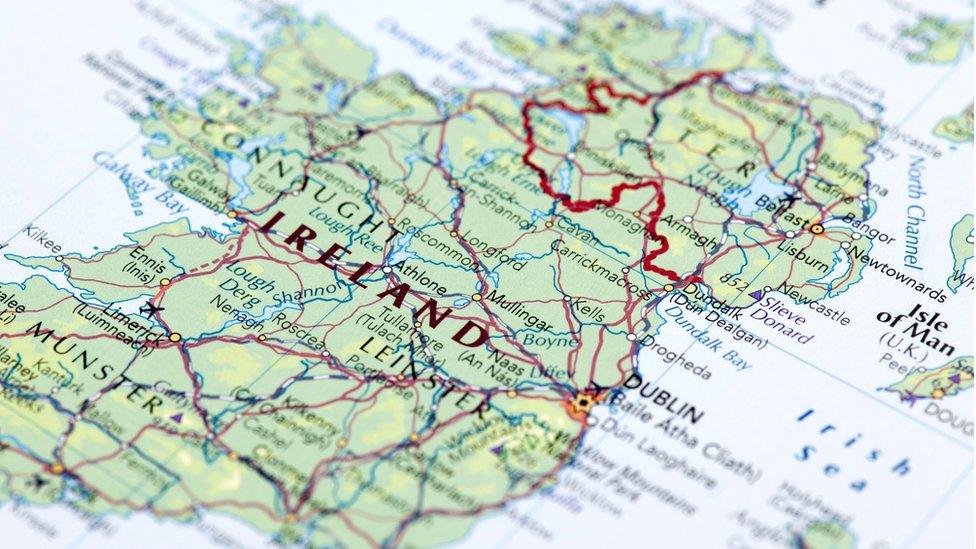
Lord Caine fears some elements of the PM's latest Brexit plan could prove destabilising
Lord Caine played a significant role in negotiating the blueprint for a new Historical Investigations Unit and other bodies intended to deal with the legacy of the Troubles.
However, he now thinks that if the package unveiled in 2014 "isn't on life support, it's looking pretty close to it".
He told Inside Politics he sees "little prospect of those bodies being up and running anytime soon".
"If you were to ask me if there's any chance of the Stormont House bodies getting through the House of Commons, then the answer is no," he said.
Lord Caine opposed the campaign for a statute of limitations, backed by many Tory MPs, which would have prevented the prosecution of military veterans for Troubles-related offences.
He said whether there is evidence of wrongdoing by anyone, be it soldier or paramilitary, it should be investigated and the law should take its course.
Lord Caine said one way forward might be modifying Northern Ireland's 1967 Criminal Law Act in order to deal with cases in which someone thought they were acting in legitimate self-defence.
'Get Brexit right'
This approach, he said, would focus on the conduct of an individual rather than discriminating between different categories of people.
Like his friend David Cameron, Lord Caine describes himself as a passionate unionist.
He voted Remain in the 2016 EU referendum because he was concerned about the potential impact of Brexit on the UK's delicate constitutional balance.
He thinks if a border poll was held in the near future there would still be a majority for Northern Ireland staying in the UK.
However, he worries about the future.
"If we get this wrong and there are economic shocks as a result of Brexit, clearly there will be greater interest amongst nationalists in pursuing the idea of a United Ireland.
"As a unionist, that's not something I want to see, so we need to get Brexit right."
You can hear the full interview on Inside Politics on BBC Radio Ulster at 18:05 BST on Friday and is available on the BBC Sounds app as well.
- Published11 October 2019
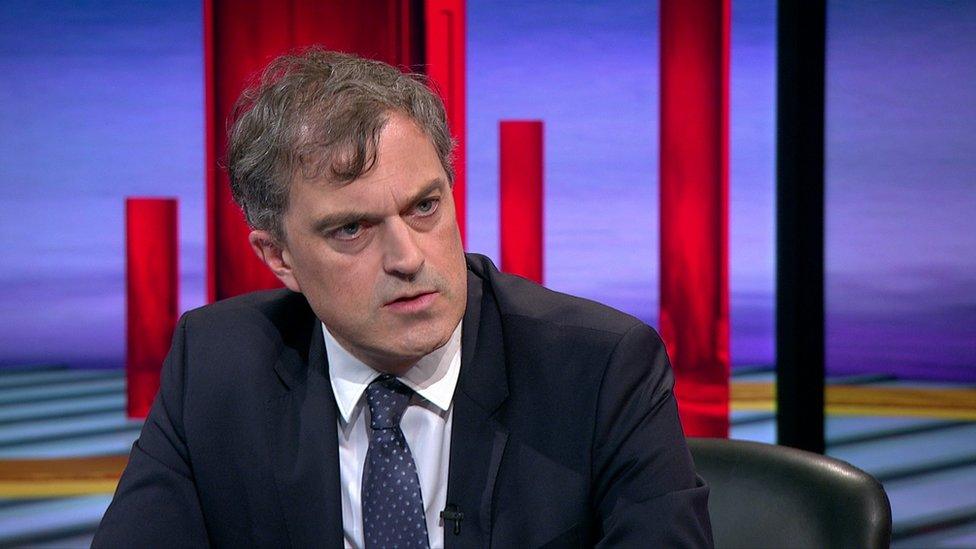
- Published4 October 2019
